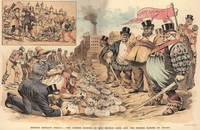 Forbes, normally more of a capitalist tool than a flaming radical rag,
keeps covering
AT&T’s Pearl Jam fiasco:
Forbes, normally more of a capitalist tool than a flaming radical rag,
keeps covering
AT&T’s Pearl Jam fiasco:
AT&T’s “content monitor” hit the mute button during part of Pearl Jam’s “Blue Room” Live Lollapalooza Webcast sponsored by the telecom, depriving viewers of some anti-George Bush lyrics—and handing live ammunition to “net neutrality” proponents in the form of an almost perfect example of what they predict will happen if a few companies are allowed to control the broadband pipeline.Their followup gets even better:— AT&T Silences Pearl Jam; Gives ‘Net Neutrality’ Proponents Ammunition, Staci D. Kramer, PaidContent.org, 08.09.07, 7:45 PM ET
AT&T spokesman Michael Coe said that the silencing was a mistake and that the company was working with the vendor that produces the webcasts to avoid future misunderstandings. He said AT&T was working to secure the rights to post the entire song – part of a sing-along with the audience – on the Blue Room site.While the lumbering dinosaur was working on that, Pearl Jam already had the uncensored version on their site.— AT&T Errs in Edit of Anti-Bush Lyrics, By MICHELLE ROBERTS, Forbes, 08.10.07, 10:59 AM ET
And it just keeps getting better. Continue reading









 Verizon has
Verizon has 